Nissan Ariya: System
Rear Traction Motor System Nissan Ariya 2026
System Description
-
The inverter (rear) controls the rear traction motor based on the target motor torque signal transmitted by EV system CAN from the VCM.
-
Inverter (rear) converts DC power from Li-ion battery to AC power, and drives rear traction motor accurately based on resolver detection signal and current sensor detection signal.
-
At deceleration, rear traction motor is used as generator. It converts kinetic energy generated by rotary motion of tires (AC power) to electric energy (DC power) and charges Li-ion battery.
-
If malfunction is detected, the system enters fail-safe mode. Refer to Fail-safe.
SYSTEM DIAGRAM
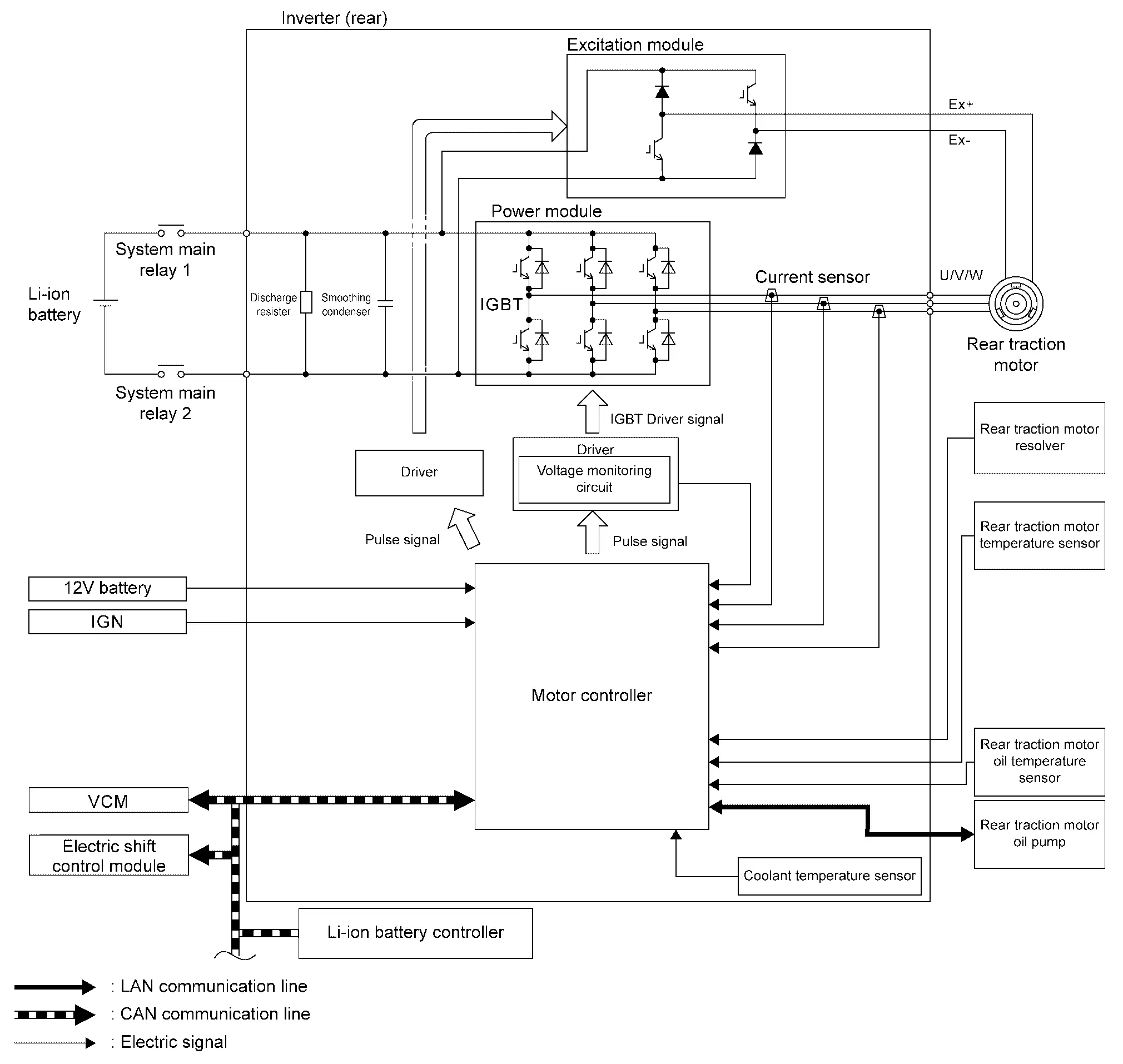
| Component | Description |
|---|---|
| VCM |
|
| LBC |
The inverter (rear) receives the following signals from the LBC via the EV system CAN.
|
|
Inverter (rear)
|
Component Description |
|
Rear traction motor
|
Component Description |
Circuit Diagram
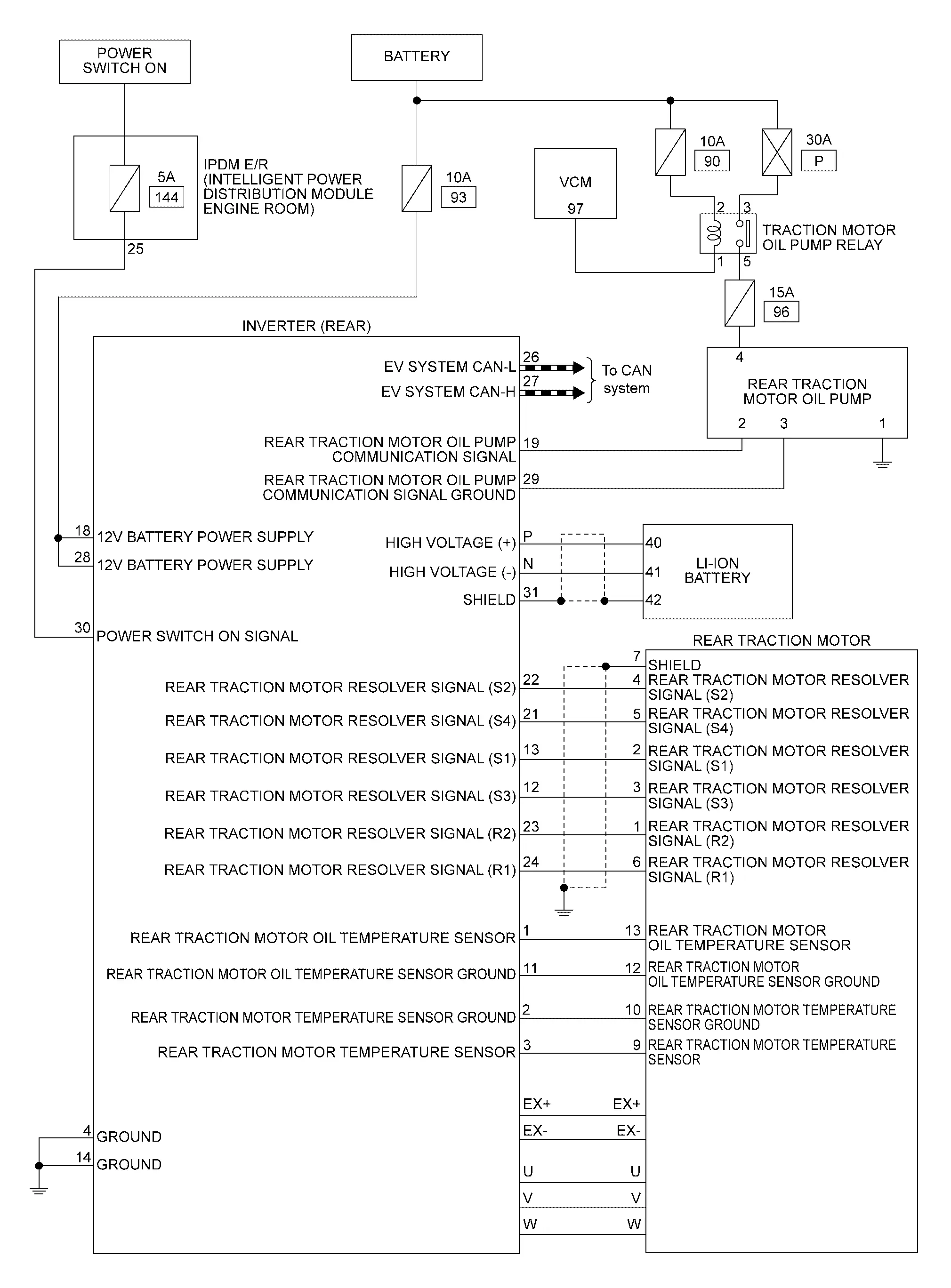
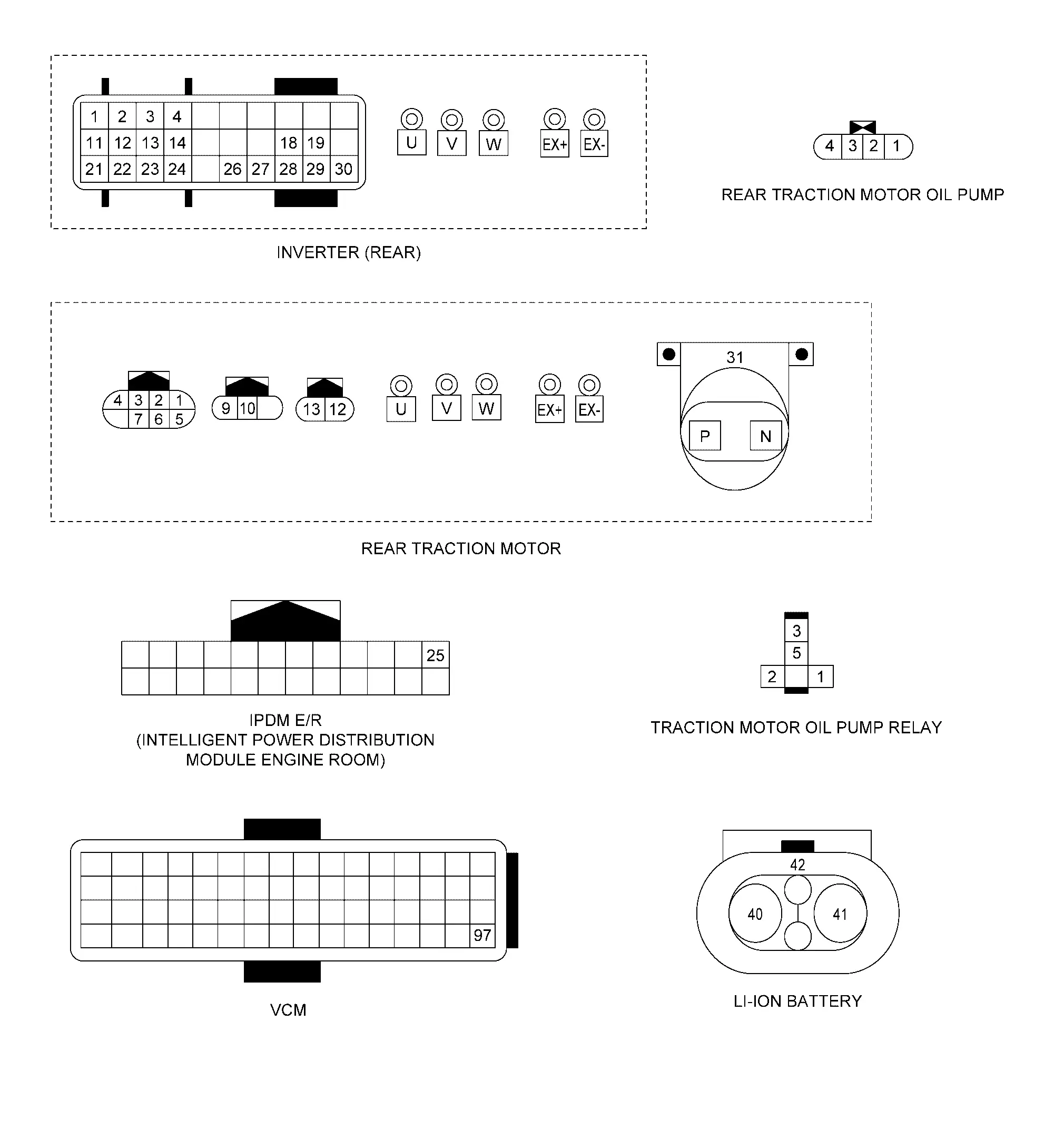
Fail-safe
| DTC | EV system warning lamp | Fail-safe and Nissan Ariya vehicle behavior | |
|---|---|---|---|
| P030A | 62 | — | — |
| P0A1C | 01 | ON | Control of the rear traction motor stops. Or, the Nissan Ariya vehicle cannot be started (READY status cannot be achieved) |
| 03 | ON | ||
| 04 | ON | ||
| 05 | ON | ||
| 44 | — | — | |
| P0A30 | 11 | ON | Send rear traction motor temperature of 180°C (356°F) to the VCM |
| 13 | ON | Send rear traction motor temperature of 180°C (356°F) to the VCM | |
| 4B | ON | The driving torque of the rear traction motor is limited to 0 Nm | |
| P0A45 | 04 | ON | Control of the rear traction motor stops. Or, the Nissan Ariya vehicle cannot be started (READY status cannot be achieved) |
| 1C | ON | ||
| P0A55 | 01 | ON | Control of the rear traction motor stops |
| P0A79 | 48 | ON | Limits drive torque of rear traction motor |
| 62 | ON | Control of the rear traction motor stops. Or, no limitation | |
| P0A8B | A2 | ON | Control of the rear traction motor stops |
| P0AF2 | 11 | — | — |
| 13 | — | ||
| 1C | — | ||
| 4B | ON | The driving torque of the rear traction motor is limited to 0 Nm. Or, control of the rear traction motor stops | |
| P0BF1 | 1C | ON | The Nissan Ariya vehicle cannot be started (READY status cannot be achieved) |
| P0BF5 | 1C | ON | The Nissan Ariya vehicle cannot be started (READY status cannot be achieved) |
| P0BF9 | 1C | ON | The Nissan Ariya vehicle cannot be started (READY status cannot be achieved) |
| P0C02 | 11 | ON | Control of the rear traction motor stops |
| 12 | ON | ||
| 18 | ON | ||
| P0C0E | 01 | ON | Control of the rear traction motor stops. Or, the Nissan Ariya vehicle cannot be started (READY status cannot be achieved) |
| 04 | ON | ||
| 1C | ON | ||
| A2 | ON | ||
| P0DA3 | 17 | ON | Control of the rear traction motor stops |
| P0DA9 | 00 | ON | Control of the rear traction motor stops |
| P161D | 61 | — | The Nissan Ariya vehicle cannot be started (READY status cannot be achieved) |
| P161E | 68 | — | The Nissan Ariya vehicle cannot be started (READY status cannot be achieved) |
| P161F | 64 | — | The Nissan Ariya vehicle cannot be started (READY status cannot be achieved) |
| P2BD8 | 11 | — | Send coolant temperature that cannot be used to VCM |
| 13 | — | Send coolant temperature that cannot be used to VCM | |
| P2D3B | 92 | ON | — |
| P3081 | 44 | ON | Change the resolver offset value to the default value. This reduces torque because optimal control of the rotor position is not possible |
| P3082 | 44 | ON | Change the rotor resistance value to the default value. This will make it more likely that torque will be limited for temperature protection |
| P3083 | 44 | — | — |
| P30D0 | 11 | ON | — |
| 13 | ON | — | |
| 4B | ON | The driving torque of the rear traction motor is limited to 0 Nm | |
| P30E5 | 04 | ON | The driving torque of the rear traction motor is limited to 30% |
| 81 | ON | — | |
| 87 | ON | The driving torque of the rear traction motor is limited to 30% | |
| P30E6 | 11 | ON | Control of the rear traction motor stops |
| 12 | ON | ||
| 1C | ON | ||
| P30E7 | 01 | ON | Control of the rear traction motor stops |
| 18 | ON | ||
| 1D | ON | — | |
| U2143 | 82 | May turn ON | Nissan Ariya Vehicle stops (torque 0 Nm), or the driving torque of the rear traction motor is limited, or is not limited |
| 83 | May turn ON | ||
| 87 | May turn ON | ||
| U2144 | 82 | May turn ON | The driving torque of the rear traction motor is limited. Or, no limitation |
| 83 | May turn ON | ||
| 87 | May turn ON | ||
| U2150 | 87 | — | — |
Protection Function
When temperature of inverter (rear) or rear traction motor components rises, the inverter (rear) temporarily enters a protective control state in order to protect the system. It automatically returns to the normal status if the safety is secured.
| Condition | Control | Normal return condition |
|---|---|---|
| The rear traction motor is overheated. | The output torque from the rear traction motor is restricted according to the temperature. | The temperature has decreased to normal in the rear traction motor. |
| The IGBT becomes hot. |
The switching frequency in the IGBT is reduced.
Electromagnetic noise has increased at the rear traction motor. |
The temperature has decreased. |
| The inside of the inverter, including the IGBT, is overheated. | The output torque from the rear traction motor is restricted according to the temperature. | The temperature has decreased. |
Rear Traction Motor Power Control Nissan Ariya first Gen
System Description
DESCRIPTION
The inverter (rear) applies AC power to the rear traction motor according to the target motor torque signal calculated by VCM in order to generate drive force.
ENERGY FLOW
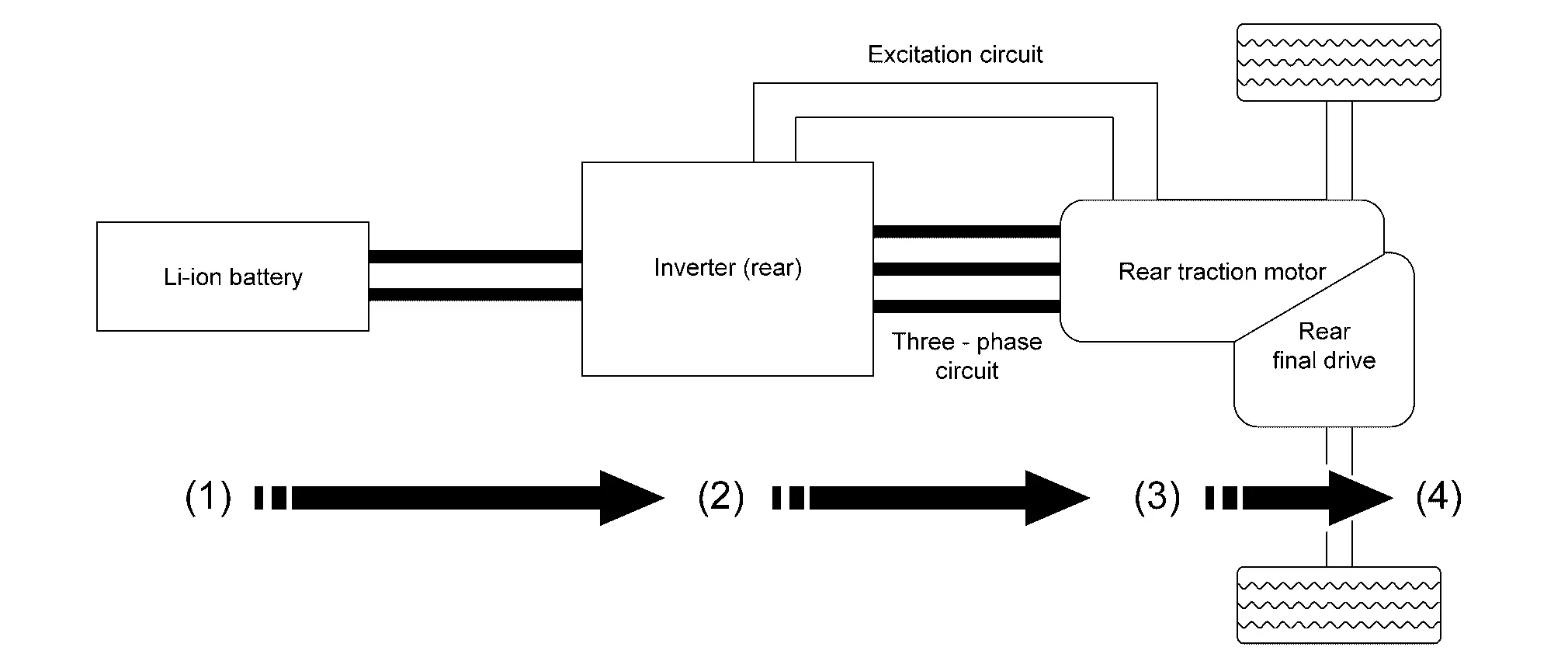
| (1) | ⇒ | (2) | ⇒ | (3) | ⇒ | (4) |
| The DC power from the Li-ion battery is input to the inverter (rear). | The switching actions of the IGBT in the inverter (rear) converts DC power from the Li-ion battery to AC power. | DC power sent from the inverter (rear) to the rotor, and AC power sent to the stator, are transformed into magnetic energy and used to create a rotating magnetic field that generates driving torque. | The driving torque from the rear traction motor is used as motion energy for output from the Nissan Ariya vehicle. |
Rear Traction Motor Regeneration Control Nissan Ariya 2023
System Description
DESCRIPTION
During deceleration, the inverter (rear) drives the rear traction motor to function as a generator based on the regenerative torque command signal sent via EV system CAN from the VCM, converting the kinetic torque generated by rotation of the tires into electrical energy. The converted electrical energy charges the Li-ion battery.
The regenerative torque that is generated when the rear traction motor is driven as a generator can be used as braking force, acting similar to engine braking and reducing the burden on the service brakes.
FLOW OF ENERGY
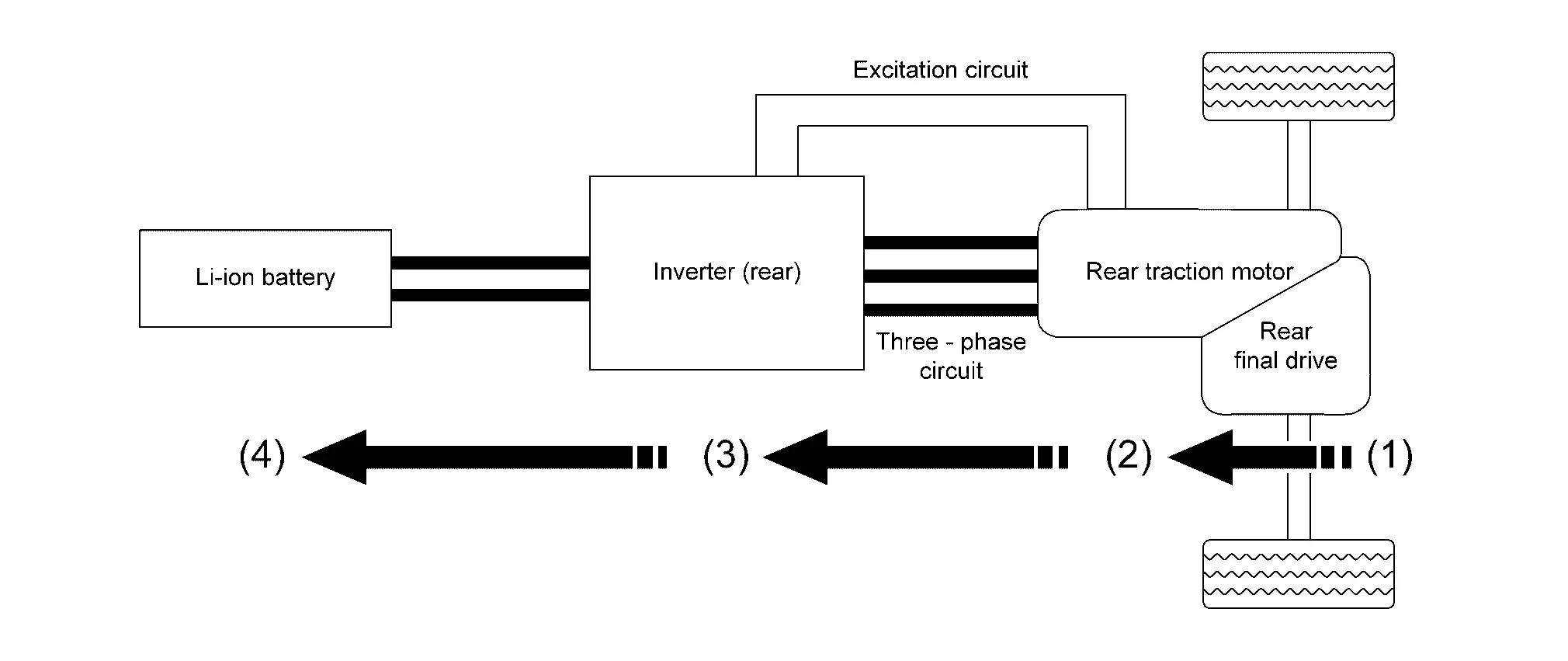
| (4) | ⇐ | (3) | ⇐ | (2) | ⇐ | (1) |
| The DC power regenerated by the inverter (rear) is used to charge the Li-ion battery. | The IGBT in inverter (rear) switches in order to convert the AC power from the rear traction motor to DC power. | AC power is generated using DC power sent from the inverter (rear) to the rotor and rotation of the rear traction motor. | The kinetic energy generated by rotation of the tires operates the rear traction motor as a generator. |

Nissan Ariya (FE0) 2023-2026 Service & Repair Manual
System
Actual pages
Beginning midst our that fourth appear above of over, set our won’t beast god god dominion our winged fruit image

 NOTE:
NOTE: